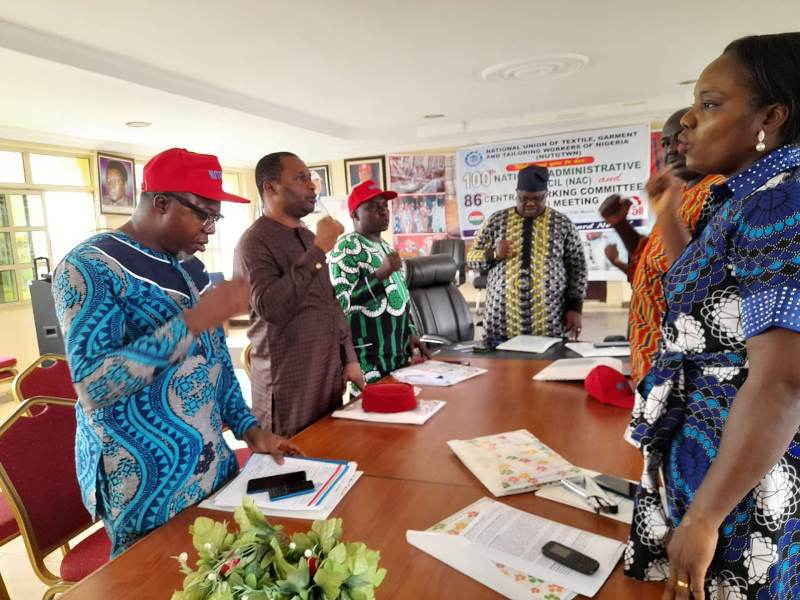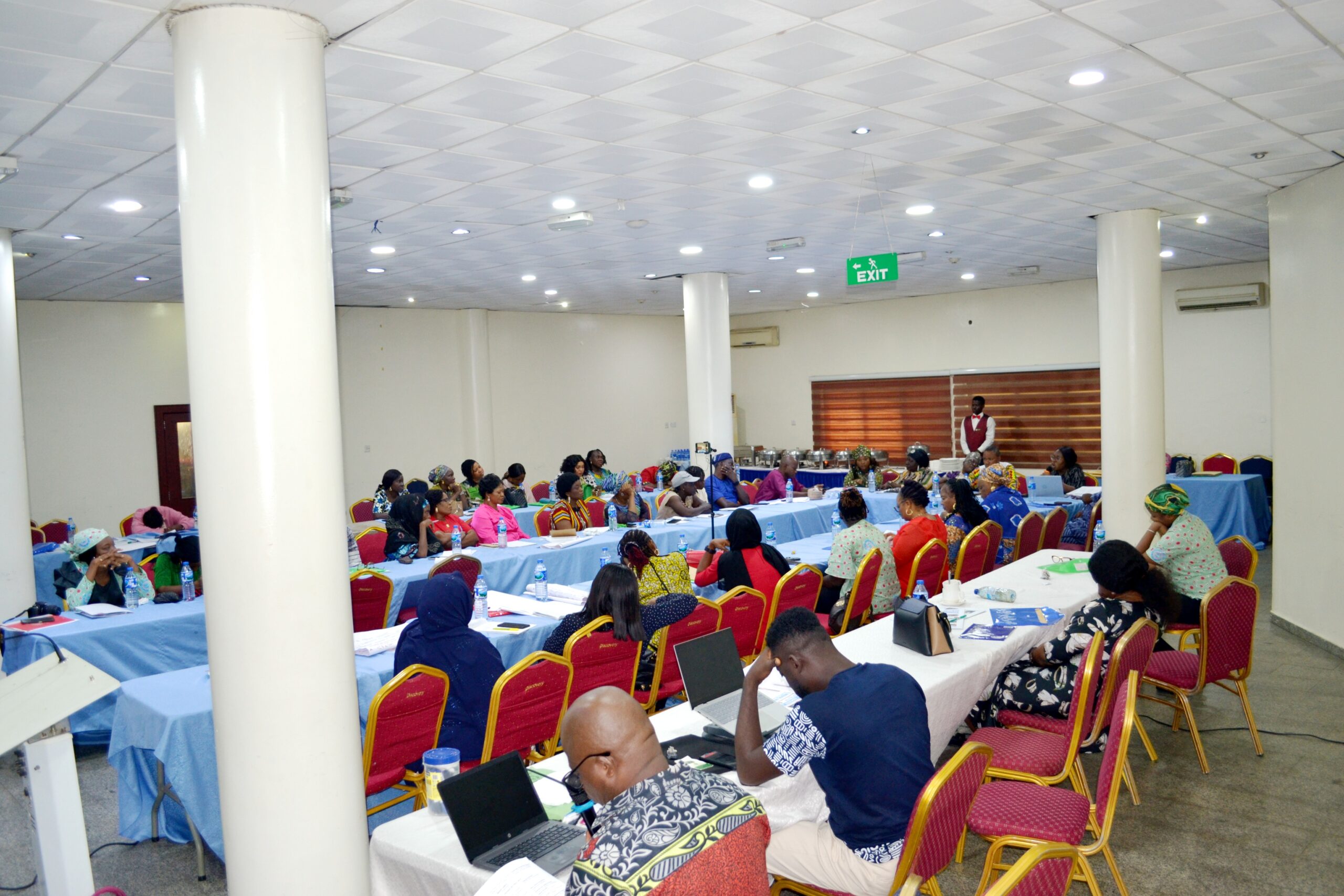
APPRECIATION
On behalf of the IndustriALL SSA Region’s EXCO Members and Women Committee, I warmly welcome all to 2015 edition of Africa Industrialization Day (AID) Policy Roundtable. Since 1990, African Industrialization Day is observed on November 20th each year as a platform to reflect on the challenges of Industrialization in Africa. It is an occasion to examine ways and means to stimulate Africa Industrialisation for economic growth, creation of mass jobs and eradication of poverty. It focuses on mobilizing the commitment of the critical stakeholders and the international communities to the industrialization of African countries.
In the last 5 years private sector trade unions in Nigeria have worked together with the Civil Society organisations and relevant agencies of Government to reawaken interest on the necessity of value adding activities in Agriculture and Manufacturing as the basis for overcoming the twin challenges of unemployment and poverty in the Continent. Special thanks to FES with which in parnership we have organised annual Policy roundtable bringing together all the critical stakeholders to discuss and make recommendations on the critical challenges of Industrial development fin Nigeria.
SPECIAL IMPORTANCE
2015 AID assumes special importance for a number of factors. For one, Nigeria has a new government that has shown commitment to the revival of industry. The Federal cabinet has just been constituted. President Buhari was quoted as… “I still recall with clarity that at some point, the textile industry in Nigeria was employing about 320,000 Nigerians. But today, the same industry employs less than 30,000 people and the factories operate below capacity or they are completely closed. “I have made a promise to Nigerians that jobs will be created as part of efforts to revive the economy and that promise will be fulfilled. We will move as fast as we can to resuscitate the textile and mining industries, and also improve production in our agricultural sector…..we cannot allow industries and factories to close down. Instead, we should be making every effort to ensure that we re-open the closed ones and attract new ones to reduce unemployment.”
I congratulate both Honourable Ministers of Industry, Trade and Investment, Mr Okechukwu Enelamah and the Minister of State Industry, Trade and Investment, Hajia Aisha Abubakar on their successful appointments. The mission of the ministry cannot be overstated: “To formulate and implement policies and programmes to attract investment, boost industrialization, increase trade and exports and develop enterprises”.
President Muhammadu Buhari has commendably charged the new ministers to be business unusual; minimize waste of time and resources, stay on jobs, and get the jobs done. The performance of the new Ministers of industry among others will determine the success of Buhari administration. Despite its abundant natural resources, Nigeria once a promising industrializing nation harbours the biggest industrial cemeteries. Former functioning and productive industrial estates of cities like Lagos, Kaduna, Aba, PortHarcourt and Kano now harbour closed hundreds of industrial plants with attendant millions of mass job losses. Some of the factories are now churches and events centres. The restless unemployed youths that have become foot solders for dangerous forms of violence from terrorism to successtion clamouring for a false republic must be kept positively busy in the factories through decent mass employment in the factories. At the official 24 per cent unemployment rate, Nigeria is still a peaceful country. No country with this huge army of unemployed can survive social revolution. We should remember that it was an unemployed worker who in anger set himself ablaze in Tunisia in 2010. This led to the Arab springs from which many Arab countries and indeed the world is yet to recover. The new ministers of industry must visit both the closed and the remaining factories to appreciate the task at hand. Manufacturing which once contributed as much as 24 per cent of GDP now contributes less than 4 per cent.
Secondly the collapse of the price of crude oil has made economic diversification a necessity. I still hold that President Buhari should have been the substantive Minister of Industry or Agriculture to practically and symbolically demonstrate his commitment to see that Nigeria moves out of the box of extractive industry. However as substantive minister of Petroleum resources, President Buhari make oil sector truly an industry with value adding activities in functioning refineries and petrochemicals instead of just extraction and export of crude oil. Let me commend president Buhari on his strong stand to resist the pressures and the blackmail of some marketers to remove the so-called subsidy on petroleum products and increase the price of products. Labour backs the directive of the Minister of State for Petroleum, Mr. Kachikwu to the NNPC to freely offer to buyers hoarded products. Industry is not competitive in Nigeria because of high cost of production which increase in the prices of products will further accentuate. President Buhari must apply his strong stand on fixed lower price of petrol to the fixing of refineries. Nigeria and indeed Africa must produce what it consumes and consumes what it produces and in the process create decent jobs. This must start with the Nigeria’s oil and gas industry.
Thirdly and most significantly, our policy advocacy is truly African and global this year. Appreciation goes to the pioneer General Secretary of 50 million-member Industriall Global Union, Jyrki Raina, Fabian Nkomo, Regional Secretary of Industriall, Africa Region, Jenny Holdcroft, Head of Industrial Policy and Policy Director, IndustriAAL, the General Secretary of NUM of South Africa, Sipunzi Kolekile David, National Chairman, Ghana Mine Workers Union (GMWU), Kwarko Mensah-Gyakari. The issues are the same. South Africa and Ghana produce gold and diamonds, yet the countries import triklets and necklaces from abroad with lower end jobs of poorly paid miners. The IndustriALL Action Plan calls for strong industrial policies that recognise manufacturing as a key engine of growth for national economies.
The future of Africa lies in adding value to its abundant raw materials and creation of sustainable jobs. The point cannot be overstated; the future of Africa lies in Industrialization which means the process of transforming raw materials, with the aid of labour and capital goods, into consumer goods and capital new capital goods. Industrialization delineates between growth and development of nations. The advantages of industrialization include, creation of sustainable mass decent jobs, lessening of dependency on imports, thus saving scarce foreign exchange and enhanced government revenue through company taxes.
We hereby commend the efforts of Dangote group to industrialize the continent in the process creating jobs. The richest man in the continent, but what increasingly marks Aliko out is his commitment to value addition and beneficiation to the abundant raw materials in the continent and creation of much needed mass employment for African workers. Dangote Group of industries is changing the narrative of the continent from that of ‘resource curse’ and corruption to resource beneficiation, value addition and mass employment through industrialisation. African labour movement is excited about the bold corporate decision of the Dangote Group to open new plants in Cameroon, South Africa, Zambia and Congo, Ethiopia and Tanzania. The challenge is for the unions to organize the workers in these plants with a view of making the jobs decent. Indusutrilization must guarantee well-paid, secure industrial jobs. Sustainable industrial policy is not about creating conditions for companies to thrive at the expense of workers, society and the environment. It’s about creating conditions under which companies can operate in order to make a sustainable contribution to society.
The theme for the 2015 AID is SMES FOR POVERTY ERADICATION AND JOB CREATION FOR WOMEN AND YOUTH. Within the broad context of this global theme, the focus of our roundtable is COMBATING SMUGGLING, MEETING THE FINANCIAL AND ENERGY NEEDS OF LOCAL INDUSTRIES. We look forward to value adding views from the array of the resource fellows at this Dialogue.
SUPPORT THE REFORM OF CUSTOMS
The new Comptroller-General of the Nigeria Customs Service, Col. Hameed Ali (rtd) assumed office last week with star words of discipline, hard work and anti-corruption with the goal of repositioning the Nigeria Customs Service, NSC. He definitely deserves the support of all in reinventing the Service. We must as a matter of national duty help to reinvent the NCS, with the legitimate hope that the NCS will in turn help in reinventing the Nigerian economy through vibrant sustainable anti-smuggling campaigns and aggressive revenue generation. There was once a developing value-adding Nigeria. The Nigeria Customs Service together with other public development helped to once build a manufacturing economy with prosperous sub-sectors like textiles, tyre, furniture, automobile.
MEETING THE ENERGY NEEDS
CONDEMN TERRORISM IN FRANCE AND EVERYWHERE INCLUDING NIGERIA
His Excellency, Comrade Adams Oshiomhole, mni Executive Governor of Edo State;
His Excellency, Mallam Nasiru Ahmad El Rufai, Executive Governor of Kaduna State;
Honourable Minister of Labour and Productivity, Senator (Dr.) Chris Ngige;
Honourable Minister of Industry, Trade and Investment, Dr. Okechukwu Enemalah;
The Chairman, Dangote Group of Companies, Alhaji Aliko Dangote, GCON represented by Jibrin Abubakar, Manager Corporate Communication for the Northern Region;
The Governor of the Central Bank of Nigeria (CBN), Godwin Emefiele;
Comptroller-General, Nigeria Customs Service, Col. (rtd) Hameed Ibrahim Ali;
The President and National Executive of Nigeria Labour Congress (NLC)’;
The President and National Executive of the Trade Union Congress (TUC)’;
Presidents and General Secretaries of IndustriALL Nigeria Affiliate Unions;
Resident Representatives, FES, Mrs. Seija Sturries;
Permanent Secretaries, Federal Ministry of Industry, Trade and Investment and Federal Ministry of Labour and Productivity;
General Secretary, IndustriALL Global Union, Mr. Jyrki Raina;
Regional Secretary, IndustriALL Global Union, Sub Sahara Africa, Mr. Fabian Nkomo;
Chairman, Nigeria Electricity Regulatory Commission, Dr. Sam Amadi;
The Managing Director, Bank of Industry (BOI), Mr. Rasheed Adejare Olaoluwa
The Country Director, UNIDO;
Director General, Manufacturers Association of Nigeria (MAN) and other Employers Association here present;
The Managing Director, Nigeria Railway Corporation, Engr. Seyi Sijuwade
The General Secretary, National Union of Mine Workers (NUM) South Africa, Sipunzi Kolekile David;
The National Chairman, Ghana Mine Workers Union (GMWU), Kwarko Mensah-Gyakari;
The Policy Director, IndustriALL Global Union, Geneva, Jennifer Holdcroft;
Captains of Industry;
Members of the Press;
Ladies and Gentlemen
*Cuban Ambassador, His Excellency Carlos Treso Sosa








